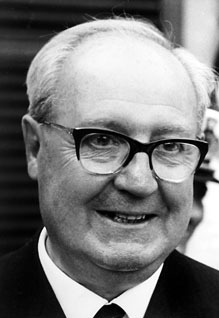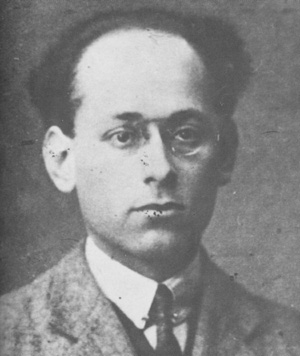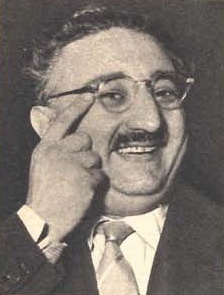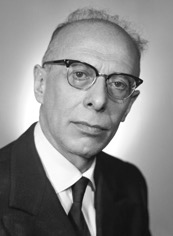|
1964 Italian Presidential Election
The 1964 Italian presidential election was held in Italy from 16 to 28 December 1964, following the resignation of President Antonio Segni on 6 December 1964 due to health problems. Only members of Parliament and regional delegates were entitled to vote, most of these electors having been elected in the 1963 general election. As head of state of the Italian Republic, the President has a role of representation of national unity and guarantees that Italian politics comply with the Italian Constitution, in the framework of a parliamentary system. Only on the twenty-first round of voting Giuseppe Saragat, the leader of Italian Democratic Socialist Party and former President of the Constituent Assembly, was finally elected President. Saragat was the first left-wing politician to become President of the Republic. Procedure In accordance with the Italian Constitution, the election was held in the form of a secret ballot, with the Senators and the Deputies entitled to vote. The elect ... [...More Info...] [...Related Items...] OR: [Wikipedia] [Google] [Baidu] |
Senate Of The Republic (Italy)
The Senate of the Republic ( it, Senato della Repubblica), or simply the Senate ( it, Senato), is the upper house of the bicameral Italian Parliament (the other being the Chamber of Deputies). The two houses together form a perfect bicameral system, meaning they perform identical functions, but do so separately. Pursuant to the Articles 57, 58, and 59 of the Italian Constitution, the Senate has 200 elective members, of which 196 are elected from Italian constituencies, and 4 from Italian citizens living abroad. Furthermore, there is a small number (currently 6) of senators for life (''senatori a vita''), either appointed or ''ex officio''. It was established in its current form on 8 May 1948, but previously existed during the Kingdom of Italy as ''Senato del Regno'' ( Senate of the Kingdom), itself a continuation of the ''Senato Subalpino'' ( Subalpine Senate) of Sardinia established on 8 May 1848. Members of the Senate are styled '' Senator'' or ''The Honourable Senator'' (Ital ... [...More Info...] [...Related Items...] OR: [Wikipedia] [Google] [Baidu] |
Parliamentary System
A parliamentary system, or parliamentarian democracy, is a system of democratic governance of a state (or subordinate entity) where the executive derives its democratic legitimacy from its ability to command the support ("confidence") of the legislature, typically a parliament, to which it is accountable. In a parliamentary system, the head of state is usually a person distinct from the head of government. This is in contrast to a presidential system, where the head of state often is also the head of government and, most importantly, where the executive does not derive its democratic legitimacy from the legislature. Countries with parliamentary systems may be constitutional monarchies, where a monarch is the head of state while the head of government is almost always a member of parliament, or parliamentary republics, where a mostly ceremonial president is the head of state while the head of government is regularly from the legislature. In a few parliamentary republics, among ... [...More Info...] [...Related Items...] OR: [Wikipedia] [Google] [Baidu] |
Amintore Fanfani
Amintore Fanfani (; 6 February 1908 – 20 November 1999) was an Italian politician and statesman, who served as 32nd prime minister of Italy for five separate terms. He was one of the best-known Italian politicians after the Second World War and a historical figure of the left-wing faction of Christian Democracy. He is also considered one of the founders of the modern Italian centre-left.Franzosi, ''The Puzzle of Strikes''PA202 p. 202/ref> Beginning as a protégé of Alcide De Gasperi, Fanfani achieved cabinet rank at a young age and occupied all the major offices of state over the course of a forty-year political career. In foreign policy, he was one of the most vocal supporters of European integration and established closer relations with the Arab world. In domestic policy, he was known for his cooperation with the Italian Socialist Party, which brought to an alliance that radically changed the country, by such measures as the nationalization of Enel, the extension of compulso ... [...More Info...] [...Related Items...] OR: [Wikipedia] [Google] [Baidu] |
Italian Socialist Party
The Italian Socialist Party (, PSI) was a socialist and later social-democratic political party in Italy, whose history stretched for longer than a century, making it one of the longest-living parties of the country. Founded in Genoa in 1892, the PSI dominated the Italian left until after World War II, when it was eclipsed in status by the Italian Communist Party. The Socialists came to special prominence in the 1980s, when their leader Bettino Craxi, who had severed the residual ties with the Soviet Union and re-branded the party as " liberal-socialist", served as Prime Minister (1983–1987). The PSI was disbanded in 1994 as a result of the ''Tangentopoli'' scandals. The party has had a series of legal successors: the Italian Socialists (1994–1998), the Italian Democratic Socialists (1998–2007) and the Italian Socialist Party (since 2007, originally "Socialist Party"). These parties have never reached the popularity of the old PSI. Socialist leading members and voters h ... [...More Info...] [...Related Items...] OR: [Wikipedia] [Google] [Baidu] |
Italian Communist Party
The Italian Communist Party ( it, Partito Comunista Italiano, PCI) was a communist political party in Italy. The PCI was founded as ''Communist Party of Italy'' on 21 January 1921 in Livorno by seceding from the Italian Socialist Party (PSI). Amadeo Bordiga, Antonio Gramsci, and Nicola Bombacci led the split. Outlawed during the Fascist regime, the party played a major role in the Italian resistance movement. It changed its name in 1943 to PCI and became the second largest political party of Italy after World War II, attracting the support of about a third of the vote share during the 1970s. At the time, it was the largest communist party in the West, with peak support reaching 2.3 million members, in 1947, and peak share being 34.4% of the vote (12.6 million votes) in the 1976 general election. The PCI transitioned from doctrinaire Marxism–Leninism to democratic socialism by the 1970s or the 1980s and adhered to the Eurocommunist trend. In 1991, it was dissolved and re-l ... [...More Info...] [...Related Items...] OR: [Wikipedia] [Google] [Baidu] |
Umberto Terracini
Umberto Elia Terracini (Genoa, 27 July 1895 – Rome, 6 December 1983) was an Italian politician. Biography Early years Terracini was born in Genoa on 27 July 1895 to a Jewish family originally from Piedmont. After completing his elementary education, Umberto attended a Jewish school, whose programs corresponded to the ministerial ones, except for the addition of the study of the language and the history of Israel; he did not derive any religious interest from his family or school, even though he regularly attended the synagogue. In those years, he began to attend the Civic Library, reading popular novels of authors like Victor Hugo, Edmondo De Amicis, Émile Zola and Eugène Sue. Before the beginning of World War I, he approached the Italian Socialist Party and in 1913 he was enrolled in the Faculty of Law of the University of Turin. Terracini immediately expressed his opposition to Italy's entry into the war. After a pacifist rally he held on 15 September 1916 he was ar ... [...More Info...] [...Related Items...] OR: [Wikipedia] [Google] [Baidu] |
Giovanni Leone
Giovanni Leone (; 3 November 1908 – 9 November 2001) was an Italian politician, jurist, and university professor. A founding member of the Christian Democracy (DC), Leone served as the President of Italy from December 1971 until June 1978. He also briefly served as Prime Minister of Italy from June to December 1963 and again from June to December 1968. He was also the president of the Chamber of Deputies from May 1955 until June 1963. Leone was the first Italian president to resign for a scandal. In 1978, he was accused of bribery amid the Lockheed bribery scandals; however, the allegations were later declared false and Leone was completely rehabilitated. Early years Leone was born in Naples in 1908 to Mauro Leone and Maria Gioffredi, both from Pomigliano d'Arco, his father, Mauro Leone, was a prominent lawyer, and had participated in the foundation of the Italian People's Party in Campania. Leone grew up in Pomigliano d'Arco, where he attended the classic lyceum, graduat ... [...More Info...] [...Related Items...] OR: [Wikipedia] [Google] [Baidu] |
Cesare Merzagora
Cesare Merzagora (9 November 1898 – 1 May 1991) was an Italian politician from Milan. Biography Merzagora was born in Milan on November 9, 1898. Between 1947 and 1949 Merzagora would serve as Italy's Minister of Foreign Trade. He was President of Banca Popolare di Milano from 1950 to 1952, President of the Italian Senate from 1953 to 1967, and was also temporarily acting head of State, in the period between the resignation of Antonio Segni and the election of Giuseppe Saragat in 1964. Merzagora was named senator for life in March of 1963. He was run as a candidate of the Italian Christian Democracy Party, and was affiliated to this party for most of his whole political career and then as an independent politician. He died in Rome , established_title = Founded , established_date = 753 BC , founder = King Romulus (legendary) , image_map = Map of comune of Rome (metropolitan city of Capital Rome, region Lazio, Italy).svg , map_caption ... [...More Info...] [...Related Items...] OR: [Wikipedia] [Google] [Baidu] |
Ennio Zelioli-Lanzini
Ennio Zelioli Lanzini (8 February 1899 – 8 February 1976) was an Italian politician that become President of the Senate in 1967. From treccani website Life and career Born in son of a school teacher, he participated in as an officer of the ''Regio Esercito''. In 1921 he graduated in law in then began his political activities but he was forced to stop his activities by the fascist regime. In 1943 he j ...[...More Info...] [...Related Items...] OR: [Wikipedia] [Google] [Baidu] |
President Of The Italian Senate
The President of the Senate of the Republic ( it, Presidente del Senato della Repubblica) is the presiding officer of the Italian Senate. The President of the Senate is the second highest-ranking office of the Italian Republic (after the President of the Republic). Since 13 October 2022, the role has been held by Ignazio La Russa. Role The President of the Senate represents the Senate to external bodies, regulates debates in the Senate chamber by applying its regulations and the rules of the Italian Constitution, and regulates all the activities of its components in order to ensure that it functions correctly. The President of the Senate, along with the President of the Chamber of Deputies, must be consulted by the President of the Republic before the latter can dissolve the Italian Parliament (Article 88). Acting President of the Republic If the President of the Republic is unable to perform their role as head of state, then the President of the Senate takes on the role, ... [...More Info...] [...Related Items...] OR: [Wikipedia] [Google] [Baidu] |
Brunetto Bucciarelli-Ducci
Brunetto Bucciarelli-Ducci (18 June 1914 – 4 February 1994) was an Italian politician and magistrate. His name appears in the list of members of the P2 lodge found in Castiglion Fibocchi on 17 March 1981. Biography Bucciarelli-Ducci was born in Terranuova Bracciolini, Province of Arezzo. He graduated in law at the University of Florence in 1937. Subsequently he passed the competition for judicial auditor in 1940 and entered the judiciary. During the Second World War he was called to arms as an artillery officer and subsequently served at the military tribunal of Bari, where he met Aldo Moro, then an airman assigned to the same tribunal, to whom he was always bound by a deep friendship. At the end of the war period he resumed his career as a magistrate as investigating judge at the Arezzo court. In 1948 he was elected Deputy in the Siena-Arezzo-Grosseto constituency and reconfirmed continuously until the 6th parliamentary term, among the ranks of the Christian Democracy. In ... [...More Info...] [...Related Items...] OR: [Wikipedia] [Google] [Baidu] |
President Of The Italian Chamber Of Deputies
The Chamber of Deputies ( it, Camera dei deputati) is the lower house of the bicameral Italian Parliament (the other being the Senate of the Republic). The two houses together form a perfect bicameral system, meaning they perform identical functions, but do so separately. The Chamber of Deputies has 400 seats, of which 392 will be elected from Italian constituencies, and 8 from Italian citizens living abroad. Deputies are styled ''The Honourable'' (Italian: ''Onorevole'') and meet at Palazzo Montecitorio. Location The seat of the Chamber of Deputies is the '' Palazzo Montecitorio'', where it has met since 1871, shortly after the capital of the Kingdom of Italy was moved to Rome at the successful conclusion of the Italian unification ''Risorgimento'' movement. Previously, the seat of the Chamber of Deputies of the Kingdom of Italy had been briefly at the ''Palazzo Carignano'' in Turin (1861–1865) and the ''Palazzo Vecchio'' in Florence (1865–1871). Under the Fascist regime ... [...More Info...] [...Related Items...] OR: [Wikipedia] [Google] [Baidu] |








